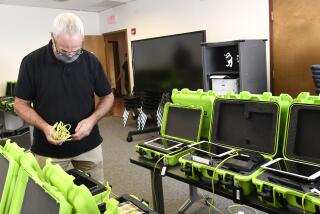Internet Voting a Matter of Technicalities
- Share via
The concerns Gary Chapman raises [“Casting a Vote of Caution on Online Voting,” March 20] about the security of online voting are legitimate, but they ultimately will prove trivial when a technical solution is found.
His concerns about relative voter participation, however, are transparently partisan.
The fear on the left is that this particular technological advance will increase the relative participation of the “wrong,” presumably more conservative, voters. But when a change in electoral processes, e.g., “motor voter” registration, disproportionately benefits the right people, the left is in favor of it.
In a National Public Radio discussion I heard a few weeks ago on this topic, even some of the opponents of Internet voting conceded that the digital divide is shrinking. Sales of computers for use in the home are projected to grow faster among ethnic minorities than among whites. Even without that, an argument could be made that Internet voting might disproportionately increase minority voting: It isn’t hard to imagine that there are lower-income voters who have better access to an Internet-connected computer than they have to transportation to polling places.
The intent of Internet voting is not to disenfranchise anyone. It is, instead, to make it easier for anyone--everyone--to vote.
JONATHAN BALL
Altadena
More to Read
Get the L.A. Times Politics newsletter
Deeply reported insights into legislation, politics and policy from Sacramento, Washington and beyond. In your inbox twice per week.
You may occasionally receive promotional content from the Los Angeles Times.









